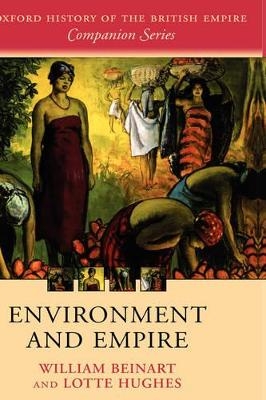
Environment and Empire
Oxford University Press (Verlag)
978-0-19-926031-7 (ISBN)
Environmental history deals with the reciprocal interaction between people and other elements in the natural world, and this book illustrates the diverse environmental themes in the history of empire. Initially concentrating on the material factors that shaped empire and environmental change, Environment and Empire discusses the way in which British consumers and manufacturers sucked in resources that were gathered, hunted, fished, mined, and farmed. Yet it is also clear that British settler and colonial states sought to regulate the use of natural resources as well as commodify them. Conservation aimed to preserve resources by exclusion, as in wildlife parks and forests, and to guarantee efficient use of soil and water. Exploring these linked themes of exploitation and conservation, this study concludes with a focus on political reassertions by colonised peoples over natural resources. In a post-imperial age, they have found a new voice, reformulating ideas about nature, landscape, and heritage and challenging, at a local and global level, views of who has the right to regulate nature.
1. Introduction ; 2. Environmental Aspects of the Atlantic Slave Trade and CaribbeanPlantations ; 3. The Fur Trade in Canada ; 4. Hunting, Wildlife, and Imperialism in Southern Africa ; 5. Imperial Travellers ; 6. Sheep, Pastures, and Demography in Australia ; 7. Forests and Forestry in India ; 8. Water, Irrigation, and Agrarian Society in India and Egypt ; 9. Colonial Cities: Environment, Space, and Race ; 10. Plague and Urban Environments ; 11. Tsetse and Trypanosomiasis in East and Central Africa ; 12. Imperial Scientists, Ecology, and Conservation ; 13. Empire and the Visual Representation of Nature ; 14. Rubber and the Environment in Malaysia ; 15. Oil Extraction in the Middle East: the Kuwait Experience ; 16. Resistance to Colonial Conservation and Resource Management ; 17. National Parks and the Growth of Tourism ; 18. The Post-Imperial Urban Environment ; 19. Reassertion of Indigenous Environmental Rights and Knowledge
| Erscheint lt. Verlag | 11.10.2007 |
|---|---|
| Reihe/Serie | Oxford History of the British Empire Companion Series |
| Zusatzinfo | 13 in-text halftones & maps |
| Verlagsort | Oxford |
| Sprache | englisch |
| Maße | 163 x 239 mm |
| Gewicht | 762 g |
| Themenwelt | Geschichte ► Allgemeine Geschichte ► Neuzeit (bis 1918) |
| Geschichte ► Teilgebiete der Geschichte ► Kulturgeschichte | |
| Geschichte ► Teilgebiete der Geschichte ► Wirtschaftsgeschichte | |
| Naturwissenschaften ► Biologie ► Ökologie / Naturschutz | |
| ISBN-10 | 0-19-926031-1 / 0199260311 |
| ISBN-13 | 978-0-19-926031-7 / 9780199260317 |
| Zustand | Neuware |
| Haben Sie eine Frage zum Produkt? |
aus dem Bereich


